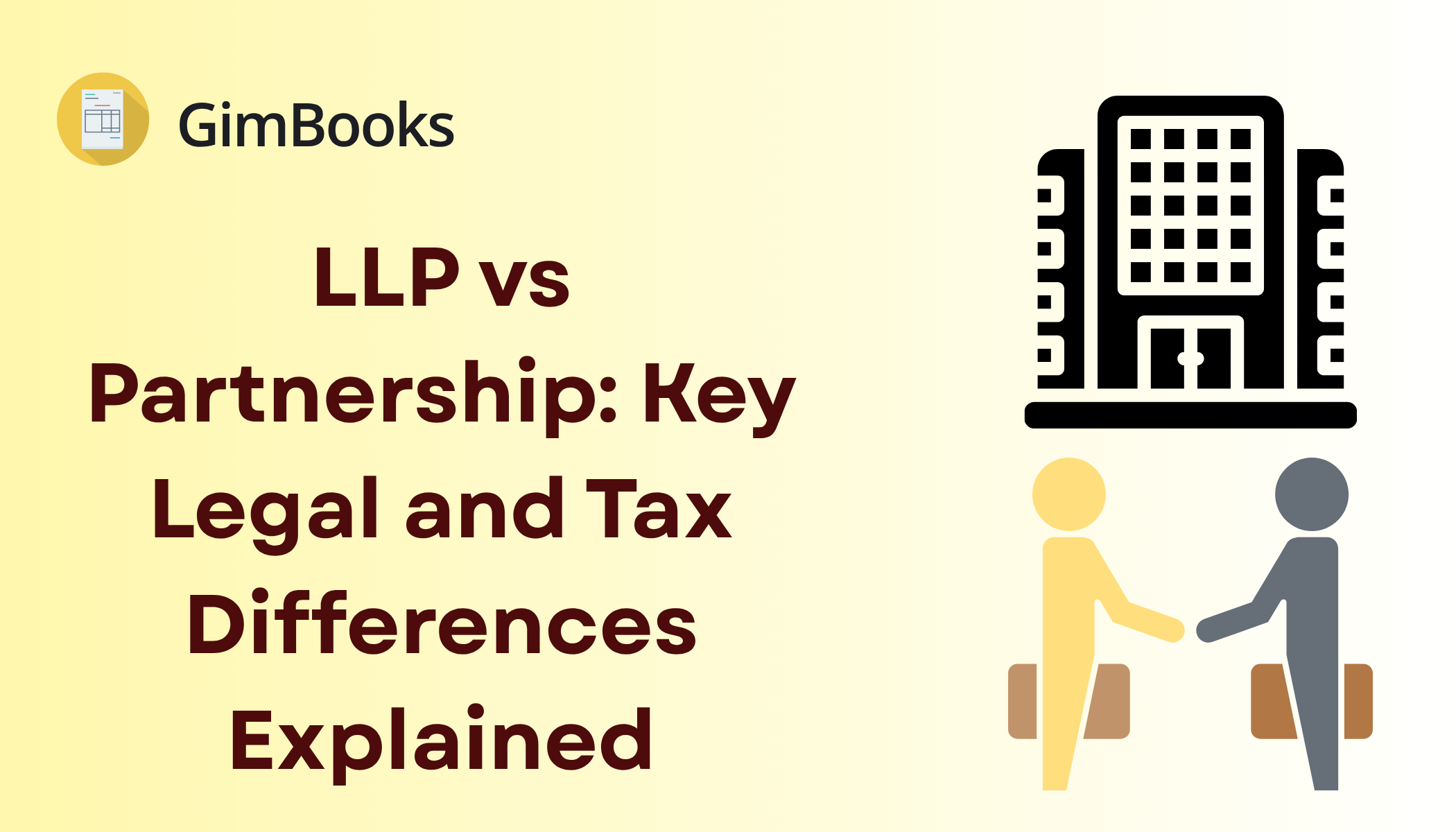LLP vs Partnership: Key Legal and Tax Differences Explained for Small Businesses

When it comes to starting a business, one of the first and most important decisions is choosing the right type of business structure. LLP vs Partnership is a common topic of confusion, especially for small and micro-sized businesses in India. While both have similarities, they also differ in legal identity, liability, compliance, taxation, and more.
This article breaks down the difference between LLP and Partnership, and clearly helps you choose the best structure for your business.
What Is a Partnership Firm?
A Partnership Firm is a business structure where two or more individuals come together to run a business and share its profits and losses. The Indian Partnership Act, 1932, governs it.
Key Features
- Easy to form and operate.
- Requires a Partnership Deed.
- No separate legal identity.
- Partners have unlimited liability.
- Not mandatory to register, but advisable.
What Is an LLP Company?
An LLP Company or Limited Liability Partnership is a hybrid structure combining features of a partnership and a company. It is governed by the Limited Liability Partnership Act, 2008, and is registered with the Ministry of Corporate Affairs (MCA).
Key Features
- Separate legal entity.
- Partners have limited liability.
- Needs LLP registration with ROC.
- More structured and organized.
- Suitable for professional services and growing businesses.
LLP vs Partnership: A Quick Comparison Table
The main difference between LLP and Partnership is that an LLP is a separate legal entity with limited liability, while a partnership firm has no separate identity and partners have unlimited liability.
The comparison between LLP vs Partnership is as follows:
| Feature | Partnership Firm | LLP Company |
| Governing Law | Indian Partnership Act, 1932 | LLP Act, 2008 |
| Legal Identity | No separate identity | Separate legal entity |
| Liability | Unlimited | Limited to the contribution |
| Registration | Optional | Mandatory with MCA |
| Taxation | Taxed as a partnership | Taxed as a partnership |
| Number of Partners | Minimum 2, Maximum 50 (verify for updates under Companies Act) | Minimum 2, Maximum unlimited |
| Audit Requirement | Required if turnover exceeds ₹1 crore (verify current threshold) | Mandatory if turnover exceeds ₹40 lakhs or contribution exceeds ₹25 lakhs |
| Transfer of Ownership | Difficult, requires consent of all partners | Easier with legal procedures and LLP agreement update |
| Compliance | Low | Moderate to high |
Cost of Formation and Compliance: LLP vs Partnership
When deciding between an LLP and a partnership firm, the cost of formation and ongoing compliance is a key factor that small businesses must consider.
1. Cost of Formation
- Partnership Firm: The cost to form a partnership is minimal. It typically includes legal fees for drafting a partnership deed, optional registration with the Registrar of Firms, and a notary fee. Most partnership firms can be set up for under ₹5,000.
- LLP Company: Setting up an LLP is more expensive. It involves LLP registration with the Ministry of Corporate Affairs, Digital Signature Certificates (DSCs), Director Identification Numbers (DINs), and the LLP Agreement filing. Total formation cost can range between ₹8,000 to ₹15,000 or more, depending on whether you use professional services.
2. Compliance Costs
- Partnership Firm: Compliance is minimal and mostly involves filing income tax returns. There are no mandatory annual reports unless the firm’s turnover exceeds ₹1 crore, making it budget-friendly for small traders.
- LLP: LLPs must file annual returns (Form 11), a Statement of Accounts & Solvency (Form 8), and income tax returns. If applicable, audits add to the compliance cost. Hiring professionals like CAs or CSs becomes necessary in many cases.
Bottom Line:
While a partnership firm is cost-effective in the short term, an LLP offers long-term benefits like credibility, security, and scalability, which often justify the extra investment for serious entrepreneurs.
Key Legal Differences Between LLP and Partnership
The key legal differences between LLP and partnership are as follows:
1. Separate Legal Identity
- Partnership Firm: The firm and its partners are the same in the eyes of the law. If the firm is sued, so are the partners.
- LLP: It is a separate legal person, just like a company. The LLP can own property, open bank accounts, and enter into contracts in its name.
2. Liability of Partners
- In a partnership firm, partners are personally liable for all business debts. If the business can't pay, personal assets may be at risk.
- In an LLP, partners are only liable up to the amount they have invested. Personal assets are safe unless there's fraud.
3. Number of Partners Allowed
- Partnership: Minimum 2, maximum 50.
- LLP: Minimum 2, LLP maximum partners are unlimited, giving more flexibility for growth.
4. Continuity
- A partnership firm dissolves if a partner dies or leaves.
- An LLP continues to exist even if partners change. It offers better business continuity.
5. Transfer of Ownership
- In a partnership, you need consent from all partners to transfer ownership.
- In an LLP, ownership can be transferred easily by changing the agreement and informing the Registrar.
Explore - Difference Between GSTR 2A and 2B with Examples
LLP vs Partnership Tax Difference Explained
The key tax difference between LLP and a partnership is as follows:
1. Taxation Method
- Both LLP and partnership firms are taxed at 30% + surcharge + cess.
- No distinction in income tax rates.
2. Dividend Distribution Tax (DDT)
- LLPs are not required to pay DDT as companies do.
- It helps avoid double taxation.
3. Tax Return Filing
- Both are required to file ITR-5.
- LLPs must also file an annual return (Form 11) and Statement of Accounts & Solvency (Form 8).
4. Audit Requirements
- Partnership Firm: Audit needed if turnover exceeds ₹1 crore.
- LLP: Audit mandatory if turnover exceeds ₹40 lakhs or capital contribution is more than ₹25 lakhs.
Also check Know Difference Between CGST and SGST
LLP and Partnership: Which One Should You Choose?
Choose a Partnership Firm if:
- You’re just starting and want minimal compliance.
- You're running a small family business or shop.
- You have complete trust in your partner(s).
Choose an LLP Company if:
- You want to limit your liability.
- You plan to scale or bring in new partners.
- You need business credibility to work with larger companies or government contracts.
Why Small Businesses Prefer LLPs Today
Due to the following reasons, small businesses prefer LLPs today:
- Protection of personal assets.
- Better structure for professional and service-based businesses.
- Ability to attract investment and new partners easily.
- Required for businesses planning to scale.
Registration Process: LLP vs Partnership
LLP Registration Steps
- Obtain Digital Signature Certificates (DSC) for all partners
- Apply for Director Identification Number (DIN)
- Choose a unique name and get it approved with the MCA
- Draft and file the LLP Agreement
- Submit incorporation forms to the Ministry of Corporate Affairs
- Receive Certificate of Incorporation
Partnership Registration Steps:
- Choose a suitable business name
- Draft a Partnership Deed detailing profit sharing and roles
- (Optional) Register the Partnership Deed with the Registrar of Firms
- Obtain PAN and TAN for the firm
- Open a current bank account in the firm’s name
Pros and Cons of LLP vs Partnership
When deciding between an LLP and a Partnership, understanding the advantages and disadvantages of each structure can help you make the right choice for your business. The following table summarizes the key pros and cons of both:
| Feature | LLP | Partnership |
| Pros | Limited liability for partners; Separate legal identity; Easier to bring in new partners; Better credibility with clients and investors; Business continuity unaffected by partner changes | Simple and cost-effective to set up; Minimal compliance requirements; Full control over business decisions; Flexible profit-sharing arrangements |
| Cons | Higher setup and compliance costs; Annual filings and audit may be required; More formalities compared to a partnership | Partners have unlimited liability; Business ends if a partner leaves or dies; Harder to transfer ownership; Lower credibility with banks and larger clients |
Real-Life Example: LLP vs Partnership
Imagine two friends, Ramesh and Suresh, starting a small bakery:
- Partnership: They start as a partnership to keep costs low. They share profits and losses, but if the bakery incurs debt, their personal assets are at risk.
- LLP: After a year, they plan to expand and take a loan. They convert into an LLP to limit personal liability, add a new partner, and gain credibility with banks and suppliers.
This scenario shows how choosing the right structure impacts growth, liability, and business credibility.
How GimBooks Helps LLPs and Partnerships Stay on Top
Whether you're running a partnership firm or an LLP company, managing your invoices, taxes, and accounts can be stressful. That’s where GimBooks comes in.
Here’s how GimBooks makes a difference:
- Easy Invoicing: Create GST-compliant invoices in seconds.
- Mobile-First Accounting: Manage your business from anywhere with the GimBooks app.
- Domain-Based Bookkeeping: Tailored solutions for different industries.
- Tax Filing Support: Organize your financial data and simplify return filing.
- Reports & Insights: Real-time business data at your fingertips.
GimBooks is specially built for small and micro-sized businesses. If you're a startup, a trader, or a service provider, this tool helps you stay compliant and focus on growth, not paperwork.
Interesting Fact: GimBooks started as a simple invoice maker and grew into a full-featured business management solution because thousands of small business owners demanded more!
Also read - Difference Between GSTR 2A and 2B with Example
Wrapping Up - LLP or Partnership which is better?
Understanding the differences in LLP vs Partnership is crucial before registering your business in India. While both structures offer flexibility and ease of operation, the choice depends on your long-term vision, risk appetite, and compliance capacity.
In the LLP vs Partnership comparison, an LLP provides added legal security, limited liability, and better scalability, making it a preferred option for growing businesses.
However, if you are starting small and want minimal compliance, a partnership firm may still be suitable. Carefully evaluating the LLP vs Partnership structure based on cost, liability, and future growth plans will help you make the right decision.
But whichever model you choose, don’t ignore your accounts and GST compliance. Use a reliable tool like GimBooks to simplify your financial management.
Let GimBooks handle your books while you focus on building your business. To know more, explore GimBook’s informative blog section specially written for small and micro businesses.
Explore - Difference Between CGST and SGST Explained Simply
FAQs: LLP vs Partnership
1. What is the main difference between LLP and a Partnership?
The main difference between LLP and Partnership is that an LLP is a separate legal entity with limited liability. In contrast, a partnership firm has no separate legal status, and the partners have unlimited liability.
2. Is LLP better than a Partnership for small businesses?
Yes, LLP offers more protection and flexibility, especially for growing businesses, as partners' assets are not at risk.
3. Can LLP have unlimited partners?
Yes, the maximum number of partners an LLP can have is unlimited, unlike partnership firms, which are limited to 50.
4. Which is easier to register - LLP or Partnership?
A partnership firm is easier and quicker to register. LLP registration takes more time as it is done through the MCA and involves more documentation.
5. Do LLPs and Partnerships pay the same tax?
Yes, both are taxed at the same rate under the Income Tax Act, but LLPs don’t pay dividend distribution tax, making them more tax-efficient in some cases.
